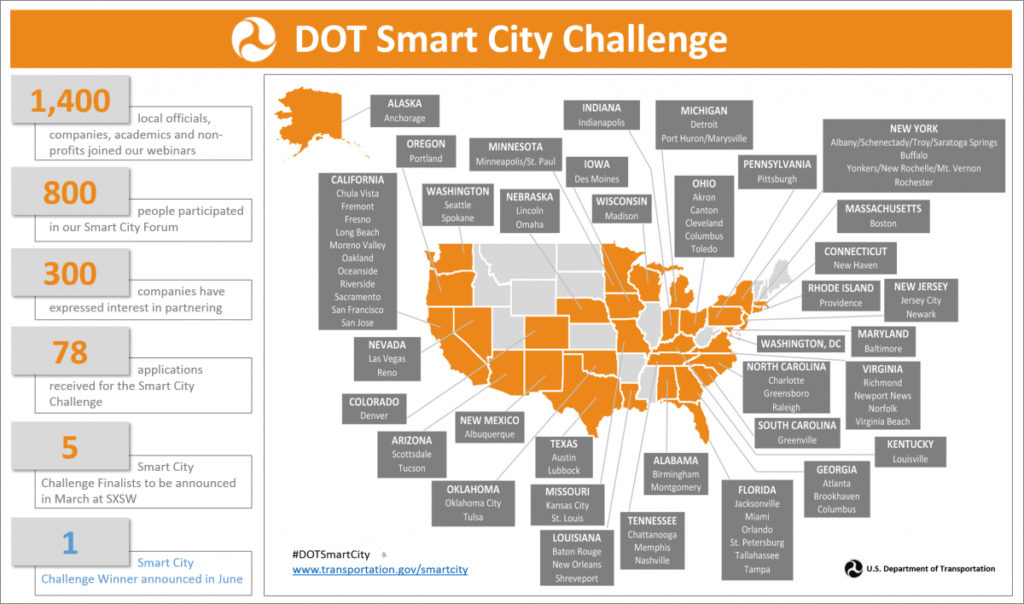The U.S. Department of Transportation (DOT), in partnership with Microsoft co-founder Paul Allen’s Vulcan Inc., has announced seven finalist cities, from a field of 78 submittals in a nationwide competition, for the DOT’s Smart City Challenge. The Smart City Challenge is designed to help cities begin to address the challenges that many communities — particularly mid-sized cities — will experience in the next few decades due to rapid population increases and rapidly growing demands on their transportation infrastructure.
To show what’s possible when communities use technology to connect transportation assets into an interactive network, the Smart City Challenge will concentrate federal resources into one medium-sized city. Funding of up to $40 million from the DOT (with an additional $10 million from Vulcan) will go to the winner to help define what it means to be a “Smart City “and become the country’s first city to fully integrate innovative technologies – self-driving cars, connected vehicles, and smart sensors — into their transportation network.
Barbara Bennett, President and COO of Vulcan, joined DOT Secretary Anthony Fox last week at the South by Southwest conference to announce the seven finalists. Commenting on the high number of Smart City applications, Ms. Bennett said:
The creativity and determination of the applicants to envision a greener future represents the best of American ingenuity. It is this kind of belief in the power of new ideas that drives Paul Allen’s commitment to solving some of the world’s greatest challenges. As the Smart City Challenge’s philanthropic partner, we hope to catalyze a transportation transformation across the country that will dramatically drive down emissions from this leading source of carbon pollution.
After a winner is selected, Vulcan will assist that city in the electrification of all possible modes of transportation, while also working with the city to lower the carbon intensity of delivered electricity and with the DOT to deploy associated technologies. Vulcan cites the following as desirable elements of a successful application:
- Conversion of city vehicle fleets, public transit, and taxis from conventional (internal combustion) to electric.
- Conversion of private fleets from conventional to electric.
- Decarbonization of the city’s electricity grid.
- Deployment or field testing of autonomous vehicles (bringing safety, traffic management, and environmental benefits).
- Increased consumer adoption of electric vehicles.
- Development of lessons learned, data-driven metrics, sustainable financing tools and other best practices that will comprise a “playbook” for other cities to follow.
Vulcan has selected Securing America’s Future Energy (SAFE) as its implementation partner. Through its projects Drive Electric Northern Colorado, Drive Electric Orlando, and the Energy Secure Cities Coalition, Securing America’s Future Energy has unique experience working with cities to create dramatic multimodal shifts in their transportation systems, providing analysis, implementing marketing and outreach plans, and offering overall support. This skillset will be particularly useful to ensure the city selected for the Smart City Challenge is successful in leading our nation to reduce its dependence on oil.
The seven Smart City Challenge finalists are:
- Austin, Texas
- Columbus, Ohio
- Denver, Colorado
- Kansas City, Missouri
- Pittsburgh, Pennsylvania
- Portland, Oregon
- San Francisco, California
I invite you to view my other posts and sign up to receive future posts via email. I also invite you to follow me on LinkedIn and Twitter, and to contact me via my homepage.

